
Get the right care for your child




Speech-language pathologists, commonly referred to as SLPs, engage in a range of duties aimed at the prevention, assessment, diagnosis, and treatment of various problems related to speech, language, social communication, cognitive-communication, and swallowing. These disorders may occur in individuals across different age groups, including both children and adults.
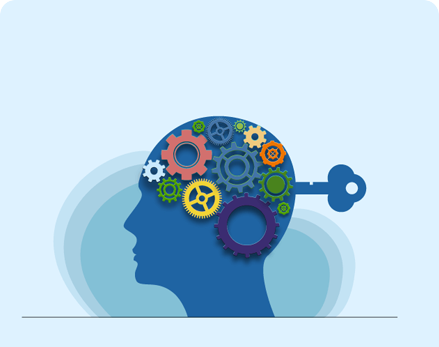
In recent years a growing number of noted mental health professionals have observed that play is as important to human happiness and well being as love and work ."Play Therapy is based upon the fact that play is the child's natural medium of self-expression. It is an opportunity which is given to the child to 'play out' his feelings and problems just as, in certain types of adult therapy, an individual 'talks out' his difficulties."The aim of play therapy is to decrease those behavioral and emotional difficulties that interfere significantly with a child's normal functioning.
Play therapy is a structured, theoretically based approach to therapy that builds on the normal communicative and learning processes of children. Through play, therapists may help children learn more adaptive behaviors when there are emotional or social skills.
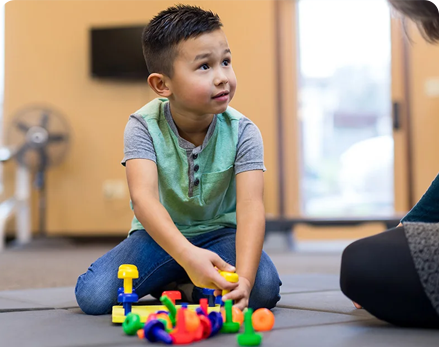
A trained mental health professional, called a play therapist, works with a child to explore and resolve problems through the therapeutic use of play. Child and therapist work together in a counselling space called a playroom, which is equipped with specially chosen toys that will encourage the safe expression of feelings and also support the development of healthier behaviors.
Reasons for treatment include, but are not limited to, temper tantrums, aggressive behavior, non-medical problems with bowel or bladder control, difficulties with sleeping or having nightmares, and experiencing worries or fears. This type of treatment is also used with children who have experienced sexual or physical abuse, neglect, the loss of a family. Our occupational therapist will provide play therapy in a child friendly environment.
People experience life to the fullest through the things they enjoy doing at work, school, at home or in their communities.
Occupational Therapy is a health profession that helps one to develop the skills needed for day to day activities when these have been hampered by developmental delay, learning problems, sensory issues or any other issue
Sensory integration is used as a part of Occupational Therapy sessions.
It is used to help children learn to use all their senses together- that is touch, smell, taste, sight and hearing.
It helps improve functions in school, at home and community. It helps to improve activities of daily living
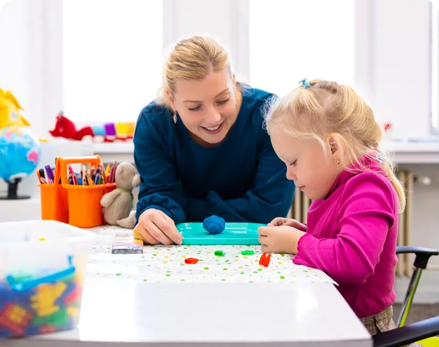
OT/ SIT is used for kids with Autism/ Learning Disability/ Intellectual Disability/ Behavioural Issues and others.
Sometimes, pharmacotherapy is inevitable for certain psychological conditions, but parents are apprehensive about starting their young children on medications due to fear of side effects. Out team will assess the need for pharmacotherapy, provide you with best available options, inform you of the potential side effects and will be in close follow up with you and your child once medications are started.

ABA is a form of therapy that is used in conjunction with other therapies, like remedial education, occupational therapy, behaviour therapy, speech therapy and the like.
ABA uses different techniques like various types of prompts, mands, and many others to modify a child’s behaviour or to enable a child to learn something new – academically or otherwise.
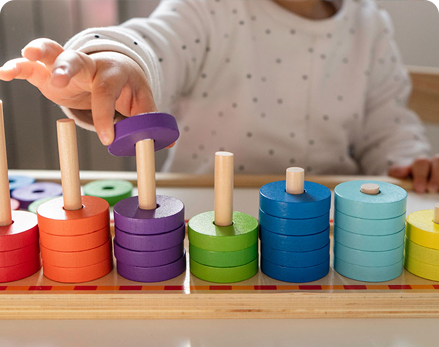
Some children have academic issues due to various reasons. Some children are unable to cope with the current academic curriculum. Some children’s foundation – in terms of education is not strong enough for them to progress.
Special / Remedial education is where the therapist sits one-to-one with a child, who has academic concerns or learning issues due to various reasons. The therapist uses various techniques or modes of teaching to make learning easy, interesting and fun. An individualised education plan (IEP) – which is suited for each individual child, is formulated
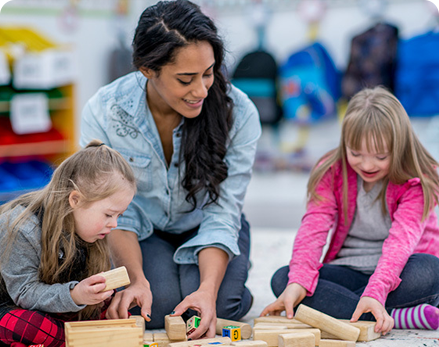
Counseling adolescents is a lot different from adult counselling.
The adolescent brain is very different from an adult brain. Right from their mood, their sleep cycle, their emotions, everything is complex. They are going through a myriad of emotions and facing a lot of competition. They may at times be indifferent and next minute be overly sensitive. Parents often feel they are walking on egg shells when they have a teenager.
Often there are disputes between parents and teenagers that only adds to the issues of the teenager.
Teenagers take time to open up, but they do with the right kind of help. Teenagers need an unbiased, non judgemental approach.
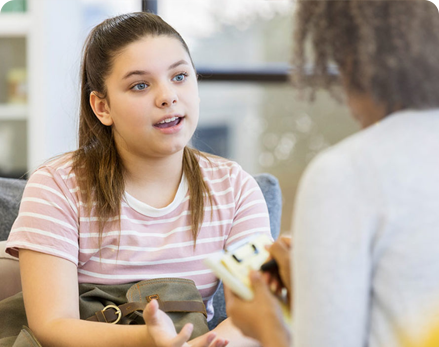
Various therapies like CBT, REBT, DBT are useful in counselling teenagers. The mainstay of these therapies is to work on the core belief system.
What happens when one suffers from a psychological issue? Their mood, emotions and behaviour is affected. When this happens, it is not just the person, but it affects the family as well.
The caregiver burden in these conditions is high, leading to expressed emotions and stress and strain between family members.
Thus when we are helping children or adolescents, it is inevitable what we counsel the entire family.
We have often seen that when family members are engaged fully in the process, the outcome and prognosis is better.

Speech-language pathologists, commonly referred to as SLPs, engage in a range of duties aimed at the prevention, assessment, diagnosis, and treatment of various problems related to speech, language, social communication, cognitive-communication, and swallowing. These disorders may occur in individuals across different age groups, including both children and adults.

In recent years a growing number of noted mental health professionals have observed that play is as important to human happiness and well being as love and work ."Play Therapy is based upon the fact that play is the child's natural medium of self-expression. It is an opportunity which is given to the child to 'play out' his feelings and problems just as, in certain types of adult therapy, an individual 'talks out' his difficulties."The aim of play therapy is to decrease those behavioral and emotional difficulties that interfere significantly with a child's normal functioning.
Play therapy is a structured, theoretically based approach to therapy that builds on the normal communicative and learning processes of children . Through play, therapists may help children learn more adaptive behaviors when there are emotional or social skills.

A trained mental health professional, called a play therapist, works with a child to explore and resolve problems through the therapeutic use of play. Child and therapist work together in a counselling space called a playroom, which is equipped with specially chosen toys that will encourage the safe expression of feelings and also support the development of healthier behaviors.
Reasons for treatment include, but are not limited to, temper tantrums, aggressive behavior, non-medical problems with bowel or bladder control, difficulties with sleeping or having nightmares, and experiencing worries or fears. This type of treatment is also used with children who have experienced sexual or physical abuse, neglect, the loss of a family. Our occupational therapist will provide play therapy in a child friendly environment.
People experience life to the fullest through the things they enjoy doing at work, school, at home or in their communities.
Occupational therapy is a health profession that helps one to develop the skills needed for day to day activities when these have been hampered by developmental delay, learning problems, sensory issues or any other issue
Sensory integration is used as a part of occupational therapy sessions.
It is used to help children learn to use all their senses together- that is touch, smlee, taste, sight and hearing.
It helps improve functions in school, at home and community. It helps to improve activities of daily living

OT/ SIT is used for kids with Autism/ Learning Disability/ Intellectual Disability/ Behavioural Issues and others.
Sometimes, pharmacotherapy is inevitable for certain psychological conditions, but parents are apprehensive about starting their young children on medications due to fear of side effects. Out team will assess the need for pharmacotherapy, provide you with best available options, inform you of the potential side effects and will be in close follow up with you and your child once medications are started.

ABA is a form of therapy that is used in conjunction with other therapies, like remedial education, occupational therapy, behaviour therapy, speech therapy and the like.
ABA uses different techniques like various types of prompts, mands, and many others to modify a child’s behaviour or to enable a child to learn something new – academically or otherwise.

Some children have academic issues due to various reasons. Some children are unable to cope with the current academic curriculum. Some children’s foundation – in terms of education is not strong enough for them to progress.
Special / Remedial education is where the therapist sits one-to-one with a child, who has academic concerns or learning issues due to various reasons. The therapist uses various techniques or modes of teaching to make learning easy, interesting and fun. An individualised education plan (IEP) – which is suited for each individual child, is formulated.

Social skills are an extremely important set of skills. However, not all kids are good at it and some may actually have deficit in social skills and this hinders their overall development. It is often the reason for a lot of behavioural and emotional problems in children and adolescents.
Social skills training is a method to train individuals and teach them how to convey their emotions and become socially competent. This helps them to live independently.
This is usually done in single sessions or in group sessions as well.
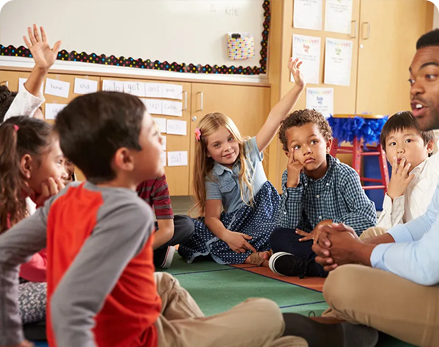
Counseling adolescents is a lot different from adult counselling.
The adolescent brain is very different from an adult brain. Right from their mood, their sleep cycle, their emotions, everything is complex. They are going through a myriad of emotions and facing a lot of competition. They may at times be indifferent and next minute be overly sensitive. Parents often feel they are walking on egg shells when they have a teenager.
Often there are disputes between parents and teenagers that only adds to the issues of the teenager.
Teenagers take time to open up, but they do with the right kind of help. Teenagers need an unbiased, non judgemental approach.

Various therapies like CBT, REBT, DBT are useful in counselling teenagers. The mainstay of these therapies is to work on the core belief system.
What happens when one suffers from a psychological issue? Their mood, emotions and behaviour is affected. When this happens, it is not just the person, but it affects the family as well.
The caregiver burden in these conditions is high, leading to expressed emotions and stress and strain between family members.
Thus when we are helping children or adolescents, it is inevitable what we counsel the entire family.
We have often seen that when family members are engaged fully in the process, the outcome and prognosis is better.


 vijayawada
8866549449
vijayawada
8866549449 vishakapatnam
9169599699
vishakapatnam
9169599699 Hyderabad7702500190
Hyderabad7702500190

Social Skills Training
Social skills are an extremely important set of skills. However, not all kids are good at it and some may actually have deficit in social skills and this hinders their overall development. It is often the reason for a lot of behavioural and emotional problems in children and adolescents
Social skills training is a method to train individuals and teach them how to convey their emotions and become socially competent. This helps them to live independently.
This is usually done in single sessions or in group sessions as well
Social Skills Training